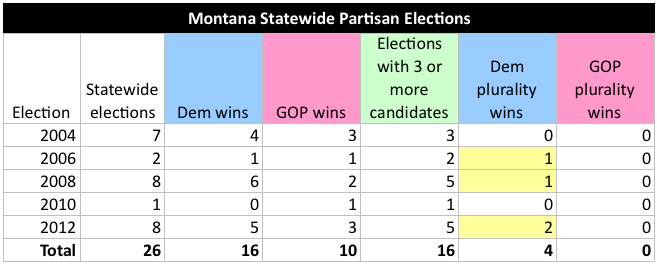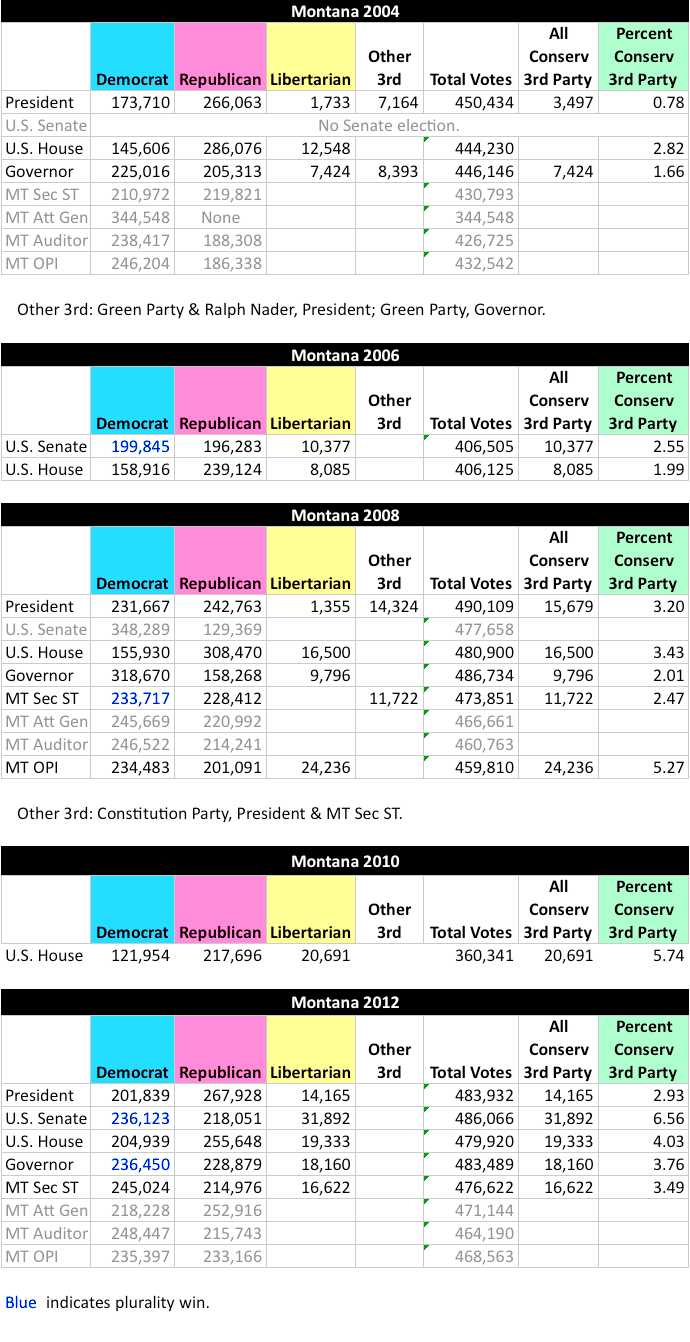Montana’s Republican establishment believes that Libertarian candidates in effect threw the 2006 U.S. Senate, and the 2012 U.S. Senate and MT gubernatorial, elections to Democrats Jon Tester and Steve Bullock, who won by narrow pluralities. Had Libertarians not been on the ballot, goes this line of thought, Libertarian voters would have marked their ballots for Republicans, who would have won.
Republicans believe this beyond a moral certainty. It’s become an article of faith, a truth, handed down by Divine Providence, not subject to dispute. The Republican mantra: “We wuz robbed!”
But were they robbed? Would those who voted for Libertarians all have voted for Republicans if Libertarians had not been on the ballot? It’s possible, but not easy to prove.
From 2004 through 2012, Montana held 26 elections (Table 2) for statewide partisan office. Ten were two-party match-ups between Democrats and Republican. Sixteen were multi-party contests, in most cases three-party contests between Democrats, Republicans, and a conservative third party, usually the Libertarian Party.

Twelve of the multi-party elections were won by a majority. Four were won by pluralities. All the plurality winners were Democrats, each of whom received at least 48.6 percent of the vote. And in those elections won by pluralities, the third party was the Libertarian Party, whose candidates received from 2.5 to 6.6 percent of the vote.
In the 2006 and 2012 U.S. Senate, and 2012 MT Governor, elections, the number of votes cast for Libertarians was greater than the difference between the Democratic and Republican candidates.

The Republican hypothesis that ideologically, Libertarians are closer to Republicans than Democrats is not unreasonable. In fact, I agree. But would all who are denied a Libertarian candidate cast their votes for the Republican? There’s no way of knowing. My back-of-the-envelope calculations suggest that in most multi-party contests, approximately half of the votes for Libertarians may come from disgruntled Republicans, and approximately half may come from Libertarians who don’t vote if a Libertarian isn’t on the ballot.
And, of course, there are Democrats, all honors graduates of the Say it with a Straight Face Academy, who will argue that the Democratic Party is the natural second home for Libertarians, and therefore Jon Tester and Steve Bullock would have won without a Libertarian assist. If you believe that, I know a guy who can get you a good price on the Brooklyn Bridge.
Although a decent case that Libertarians who exercised their right to run for office denied Republicans a victory in four elections in which the majority of voters were conservative, Montana’s voters decided that outcome was acceptable when they approved the 1972 Montana Constitution in a plebiscite. The constitutional requirement for winning an election is receiving the most votes, not receiving a majority of the votes. Therefore, there's no provision for a runoff election if the winner receives only a plurality.
Requiring only a plurality for victory can have strange effects in a multi-party election. One is the perturbing effect of a party that receives only a few percent of the vote, such as occurred in Montana in 2006 and 2012. Another is illustrated best by the gubernatorial victories of Paul LePage in Maine and Jesse Ventura in Minnesota. Both won with pluralities of less than 40 percent. And neither would likely have won a runoff. Yet another example comes from Montana’s 2012 primary, which was a textbook case of a situation best resolved by an instant runoff election.
Montana’s Republicans want to prevent Montana’s Libertarians from perturbing elections. The establishment wing of the party prefers doing that with a top two primary, the awful scheme employed in states such as California, Washington, and Louisiana. The tea part wing of the party prefers a closed primary followed by a general election in which a plurality win triggers a runoff between the two candidates with the most votes. The debate within the Republican Party is over means, not ends, although that distinction does not obviate the possibility of a mean spirited end to their debate.
Neither wing seems to be considering an elegant solution that assures winning by majority, not plurality: an instant runoff election. Fairvote.org has a full description of the method, which uses a ranked ballot. Instant runoff is fair, fast, hard to game, and significantly less expensive and disruptive than a standard runoff election. I have every confidence that the voters and county election administrators of Montana are more than smart enough to recognize the merit of an instant runoff system, and more than savvy enough to make it work. An instant runoff election ensures that an election’s winner received majority support, so it’s a mystery to me why both the Republican and Democratic Parties seem to disdain or even fear it.